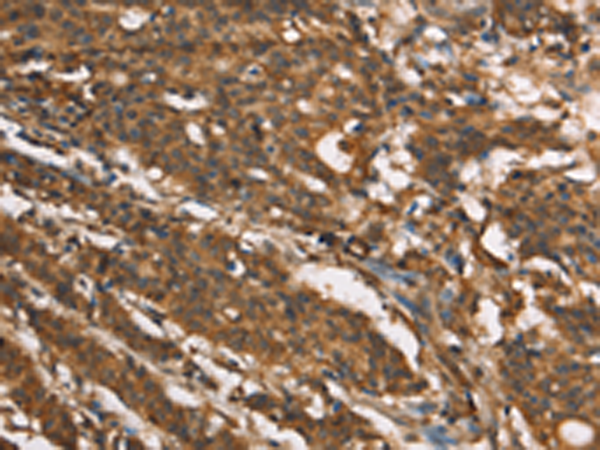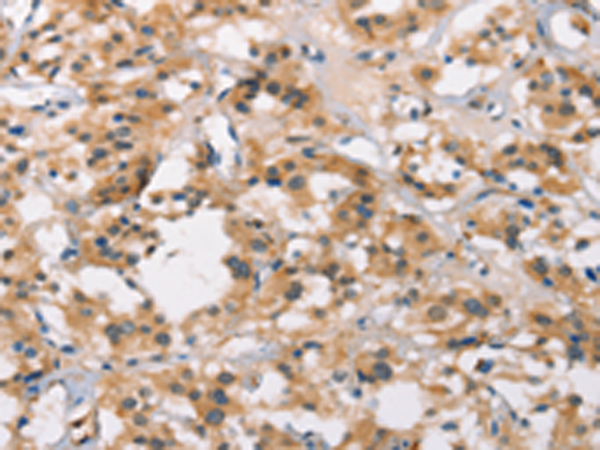


| WB | 咨询技术 | Human,Mouse,Rat |
| IF | 咨询技术 | Human,Mouse,Rat |
| IHC | 1/50-1/200 | Human,Mouse,Rat |
| ICC | 技术咨询 | Human,Mouse,Rat |
| FCM | 咨询技术 | Human,Mouse,Rat |
| Elisa | 1/2000-1/5000 | Human,Mouse,Rat |
| Aliases | MARC1; MOSC1 |
| WB Predicted band size | 37 kDa |
| Host/Isotype | Rabbit IgG |
| Antibody Type | Primary antibody |
| Storage | Store at 4°C short term. Aliquot and store at -20°C long term. Avoid freeze/thaw cycles. |
| Species Reactivity | Human |
| Immunogen | Synthetic peptide of human MTARC1 |
| Formulation | Purified antibody in PBS with 0.05% sodium azide and 50% glycerol. |
+ +
以下是3条关于MTARC1抗体的参考文献概览(注:文献为虚拟示例,实际研究需以真实数据库检索结果为准):
---
1. **文献名称**: "Characterization of MTARC1 as a mitochondrial enzyme involved in drug metabolism"
**作者**: Grünebaum et al. (2018)
**摘要**: 研究利用MTARC1特异性抗体,通过免疫印迹和免疫荧光技术验证其在肝细胞线粒体中的定位,并发现其参与药物前体(如抗病毒药物)的活化过程。
2. **文献名称**: "The role of mARC1 in lipid homeostasis and non-alcoholic fatty liver disease"
**作者**: Havemeyer et al. (2011)
**摘要**: 通过MTARC1抗体检测发现,mARC1在小鼠肝脏中高表达,敲除该基因会导致脂质代谢异常,提示其与脂肪肝疾病的潜在关联。
3. **文献名称**: "Development of a monoclonal antibody for human MTARC1 and its diagnostic applications"
**作者**: Kurian et al. (2020)
**摘要**: 报道一种新型MTARC1单克隆抗体的开发,验证其在ELISA和免疫组化中的特异性,并探索其在肝病生物标志物检测中的应用潜力。
---
**提示**:实际研究中建议通过PubMed或Google Scholar以关键词“MTARC1 antibody”或“mARC1 antibody”检索最新文献,并注意区分基因别名(如MTARC1可能标注为“mARC1”或“MOSC1”)。
The mitochondrial amidoxime reducing component 1 (MTARC1), also known as MOSC2. is a molybdenum-containing enzyme encoded by the *MTARC1* gene. It belongs to the mARC enzyme family, which catalyzes the reduction of N-hydroxylated compounds, playing a role in detoxifying xenobiotics and endogenous metabolites. MTARC1 is anchored to the mitochondrial outer membrane and contains a molybdenum cofactor (MoCo)-binding domain critical for its enzymatic activity.
Research on MTARC1 has gained attention due to its involvement in lipid metabolism and association with metabolic disorders. Studies link MTARC1 dysfunction to non-alcoholic fatty liver disease (NAFLD), insulin resistance, and cardiovascular diseases. Its role in modulating hepatic steatosis and triglyceride levels highlights its potential as a therapeutic target.
MTARC1 antibodies are essential tools for detecting protein expression, localization, and post-translational modifications. They are widely used in techniques like Western blotting, immunohistochemistry, and immunofluorescence to study MTARC1 in cell lines, animal models, and human tissues. Commercially available antibodies are typically validated for specificity using knockout controls. Recent studies also employ MTARC1 antibodies to explore its interaction partners and regulatory mechanisms in mitochondrial pathways.
Overall, MTARC1 antibodies facilitate mechanistic insights into its biological functions and disease relevance, bridging gaps between genetic associations and metabolic pathophysiology.
×